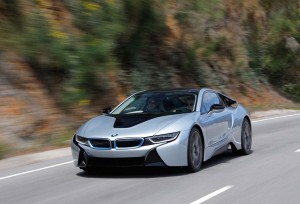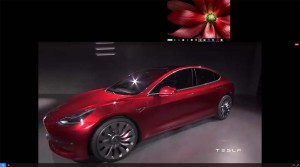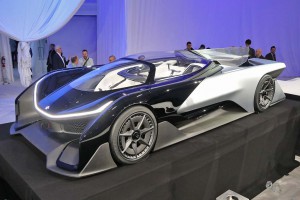It still refuses to acknowledge any plans to develop a car of its own, but consumer electronics giant Apple has reportedly been poaching a number of auto industry veterans for what is believed to be known internally as Project Titan – and that now includes a senior Tesla executive.
Chris Porritt, a one-time Aston Martin designer, had been more recently working at Tesla, helping in the development of its two current products, the Models S and X, as well as the upcoming Model 3 battery-electric sedan. According reports in several Silicon Valley publications, Porritt will now serve at Apple as Special Projects Group PD Administrator.
Porritt, however, isn’t the only battery-car executive jumping ship. German automaker BMW has reportedly lost a number of key members from the team that developed it i3 and i8 electric vehicles. The group, which includes Carsten Breitfeld, leader of the team behind the i8 plug-in sports car, will now work on EV development for the Chinese-funded start-up Future Mobility Corp.
Tesla itself hired a number of talented designers, engineers and other executives from the auto industry establishment when it started up 13 years ago. That pace accelerated as the firm laid out plans for a bigger product portfolio. But the pace of the poaching has been accelerating, observers suggest, as more new entrants target the auto industry.
(Tesla Model X plagued by quality problems. Click Here for the latest.)
That would have been unlikely as recently as two decades ago. Only a handful of players had cracked the code and successfully entered the global auto industry since the end of the Second World War. But things have begun to change as the automobile evolved from a mostly mechanical machine to one making extensive use of digital technologies for everything from infotainment and safety systems to electric propulsion.
By the beginning of the next decade, several automakers plan to have fully self-driving vehicles in production and Tesla late last year launched semi-autonomous AutoPilot system.
Meanwhile, increasingly strict global emissions and fuel economy standards are forcing even traditional automakers to invest heavily in alternative propulsions technologies. General Motors recently launched the second-generation Chevrolet Volt plug-in hybrid and Chevy Bolt battery-electric vehicle. VW has projected that at least 25% of its total sales will be battery-based within the next decade.
(Chinese-funded Faraday Future breaks ground on $1 bil Las Vegas assembly plant. Click Here for more.)
But established automakers face a variety of limits, including assembly plants designed to produce traditional, gas or diesel-powered vehicles. Officials with Tesla and another start-up, Faraday Future, have underscored the freedom and flexibility they have to start essentially from scratch.
All that has encouraged moves by Silicon Valley and other high-tech centers. Both Faraday and Future Mobility are relying on Chinese money.
The big uncertainty is what Apple, the company with the highest market evaluation in the world, has in mind. There have been numerous reports indicating its intention to go into the car business, and the poaching of BMW’s Porritt marks just the latest automotive executive to be hired by the traditionally secretive company.
Last summer, Tesla’s Jamie Carlson, a specialist in self-driving vehicles, announced he was moving to Apple in a post on LinkedIn. A similar posting on LinkedIn revealed Apple had hired Doug Betts, former quality control chief at Chrysler.
Faraday Future has been creating a talent pool that also includes veterans from traditional automakers, as well as Tesla.
But the big surprise might be the move by Future Mobility to hire away some of BMW’s best-and-brightest from the “i” team. That includes not only Breitfeld but Dirk Abendroth, a senior powertrain specialist, and Henrik Wenders, who oversaw product management for the electric sub-brand.
Some observers have suggested that some of those assigned to BMW i have grown frustrated by the slow pace of product development. BMW CEO Harald Kruger recently said no additional models will come to market until at least 2020.
The battery-electric space could yet see still more new players. There has been speculation, for example, that Google may reverse course and decide to build its own vehicles, rather than simply license its autonomous technology to other automakers. One thing seems certain, there will be even more rapid job turnover within the industry in the years ahead.
(VW teases new “advanced luxury” SUV ahead of Beijing Auto Show. Click Here to check it out.)



